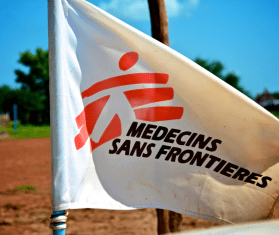Last updated on June 6, 2024
Transcript
I just came back from Al-Aqsa Hospital, one of the only remaining functioning hospitals from the Ministry of Health in Gaza. It is situated in the Middle Area, in a town called Deir al-Balah. The past 48 hours—and especially the last 24—have seen an insane escalation of hostilities in the entire Gaza Strip, with bombings simultaneously in the north, in the Middle Area, Khan Younis, and Rafah.
We have seen hospitals being bombed. We have seen refugee camps being bombed. We have seen humanitarian warehouses being bombed. The situation is apocalyptic. This morning, on my way to the hospital, I saw two donkeys carrying the bodies of at least eight people who had died in the hostilities of the last night. When we arrived, the emergency room was completely packed. There were hundreds of people who were inside the emergency department, but also outside. There were families screaming.


Al-Aqsa Hospital received at least 70 dead and more than 300 wounded patients after an escalation of fighting and bombing this week. Palestine 2024 © MSF
There was a man screaming for his family that had died in the last 24 hours. This hospital, which is still functioning—I don't know how—received over 70 dead bodies and well over 300 wounded patients, many of them critically injured. The odor of blood when I entered the emergency room was just overwhelming. People are lying on the floor. People are lying outside. People are lying in extensions of the emergency department in tents, bodies being brought in white plastic bags, the families standing over them and praying.
It's just an emotionally overwhelming situation, and it's difficult.
It's just impossible for anyone to cope because the Rafah border has been closed since the 7th of May. There have been no medical supplies that have been able to go in. There has been very little fuel coming in. There has been no food coming in. As the hostilities intensify and the health facilities diminish, we are in a situation that is just untenable. And soon there will be nothing that we can do with the patients that are coming.

These repeated mass casualty incidents that happen day after day after day—especially in Al-Aqsa Hospital—have stretched the system to the point of collapse. It is already a miracle that health care workers are still standing, providing care to Palestinians coming [into the hospitals]. To be frank, there is no coping going on right now. It's just barely surviving. We're in a literal washing machine and we don't know when this situation will stop because the border is closed.
Palestinians who need to receive care outside of Gaza for their critical wounds are unable to be referred. Medical evacuations outside of Gaza should be facilitated, without prejudice to Palestinians’ right to return.
The message repeats itself, but it needs to be repeated. We need a ceasefire. Only a ceasefire would allow for the scaling up of humanitarian aid, for the scaling up of personnel to provide the support needed to the hospital, of supplies for the hospitals, of food for the population, of fuel to be able to run the hospitals.
This is a manmade catastrophe and it can be fixed. We just need to want to fix it.




